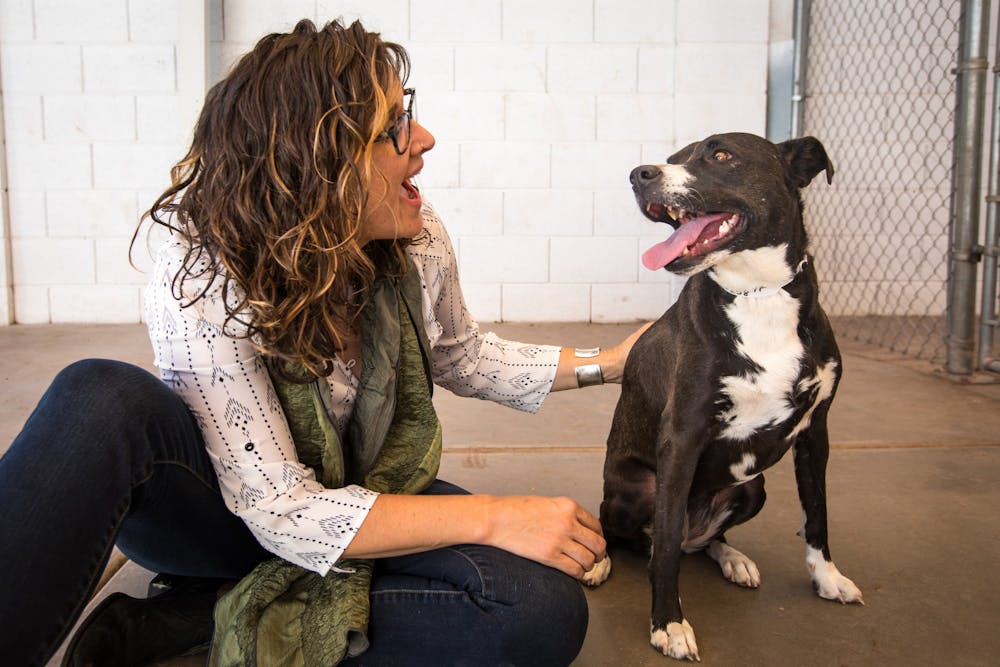Researchers within ASU's Canine Science Collaboratory might have found a way to help shelter dogs get better adoption placements.
Lisa Gunter, a Maddie’s Fund research fellow who recently received her Ph.D., and her team at the Canine Science Collaboratory are trying to reduce the number of dogs that are being returned through psychology.
According to Orvis News, 3.3 million dogs enter an animal shelter each year, and 47% of these dogs are returned due to "pet problems."
The work that Gunter is doing aims to better understand what shelter dogs experience in order to improve the level of care they receive after adoption.
The team's research
Gunter and her team's research included looking into the breed labeling of dogs and how a label influences the perception of breeds. For example, many people consider Pitbulls aggressive, and the team of researchers hopes misconstrued labels like that will go away.
According to the National Library of Medicine National Institutes of Health, when Pitbulls are not labeled, they have a shorter stay at adoption centers.
Gunter and her team also performed genetic testing to understand the different breeds of the dogs within the shelter, how exercising with adopters impacted their relationship and how providing temporary sleepovers for the dogs impacted their welfare.
READ MORE: ASU researchers prove that shelters are home to the original designer dogs
All of these tests could lead to helping the dogs get a home in the future.
“My work has focused on bettering the lives of dogs,” Gunter said. “What can we do to improve the lives of dogs, help them have better outcomes, help them have better placement after adoption?”
Shelter involvement
The team hopes to identify the impact of shelter environments on dogs' well-being in order to improve their welfare in terms of rest, stressors and behavior with people.
The studies done by the research team can help determine if a dog is ready to be in a home, especially since some dogs have a hard time transitioning from shelters.
“There are so many creative, wonderful people that are trying to better the lives of dogs that we don't have to be the ones always coming with the ideas,” Gunter said. “But then our expertise is in designing research studies to help test the efficacy of these types of programs and practices."
Debbie McKnight, vice president of field and animal welfare at the Arizona Humane Society, worked closely with the research team and oversaw the “behavior team," which is the group that selects the dogs that participate in the study.
McKnight said that since her shelter was one of the first that Gunter did the study with, they provided dogs that were friendly and easy to work with.
"We just tried to pick animals that were suitable and off the adoption floor, and out in a home for a couple of days that did not disrupt the flow of the shelter and also were easy to manage by our fosters,” she said.
McKnight said she believes more focus needs to be placed on finding out more about shelter pets and reducing their stress.
This is because dogs tend to be very stressed in shelters, she said. There are many distractions and situations that can cause animals to feel stressed and uncomfortable during their stay.
Michael Morefield, the marketing and communications director at Arizona Animal Welfare League, is part of another shelter that provided dogs and space for Gunter’s studies.
Morefield said these studies will help his shelter become more effective because they have "put us at the forefront of information, projects and research."
“We are constantly wanting to be innovative as an animal shelter,” Morefield said. “So you want to partner with other groups that see the future of animal welfare.”
Morefield said the research conducted by Gunter, particularly the studies focused on breed labels, has resulted in more adoption success at his shelter.
"The dog’s environment and behavior and their history that’s current is what’s going to determine the personality of that dog, not (the breed label)."
What's happening now?
Currently, Gunter is working on a few new projects.
One of them is looking at three different types of fostering in animal shelters, including short "field trips," which will include being away from the shelter for up to two hours, 1-2 night sleepovers and long-term fostering.
Gunter and her team also hope to continue learning more about the programs and characteristics of shelters and the impact they have on dogs. Part of this includes the “morale and satisfaction” of the staff and volunteers that participate in the programs.
Another one of the projects involves working with four shelters across the country and goes back to addressing the welfare of the dogs and what kind of impact shelters have on them by measuring their cortisol levels, rest and activity. The team measures this by observing how much being two hours away from the shelter impacts the welfare of the dogs.
Since the previous studies focused on the welfare of the dogs after being away for long periods of time, Gunter is excited to see how these short "field trips" will impact the dogs.
“We’re excited about that work because of the shorter duration, and so we’re curious if it had the same effect or if perhaps what you do makes a difference,” Gunter said.
Future research
In the future, Gunter wants to observe the behavior of dogs in kennels and how this is related to their welfare. She wants to take those behaviors and make it a more applied tool in terms of deciding if these dogs are ready to be out of the shelters.
“I think I’m a curious person, and I want to know how the world works around me,” Gunter said. “But I feel like, ultimately, when you can do research, you feel like you’re making the world a better place.”
Correction: A previous version of this story incorrectly stated Gunter's title, the article has been updated to reflect the change. The photo caption originally included the same mistake, and it has been updated as well.
Reach the reporters at ljchatha@asu.edu and follow @alphaluke15 on Twitter.
Like The State Press on Facebook and follow @statepress on Twitter.

Luke Chatham is a Community & Culture reporter and previous Business and Tech reporter. He also worked in the studio production crew for Cronkite News and is currently a freelance reporter and writer for Arcadia News.




